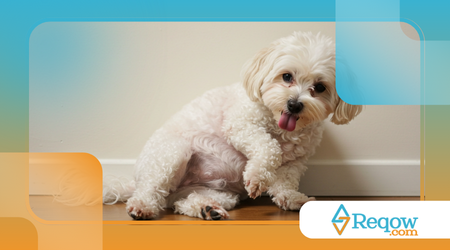My dog is licking himself too much: common behavior or health problem?

It's normal for dogs to lick themselves. They do it to clean themselves, to calm themselves, and even out of pure habit. But when this behavior becomes repetitive, persistent, or obsessive, it's time to sound the alarm. After all, my dog is licking himself too much It could be either a behavioral issue or a health problem that needs attention.
Advertisements
Dogs communicate with their bodies. When something bothers them, they show it—and excessive licking is often one of the first signs. But how can you tell if it's just a habit or something more serious? This question is common among owners, and if ignored, it can end up making the problem worse.
In this article, you'll understand why this behavior occurs, how to differentiate between what's normal and what requires treatment, and what precautions to take to ensure your companion's well-being.
What is considered excessive licking in dogs?
Not all licking is a sign of a problem. A dog may lick itself after eating, upon waking, or when cleaning itself, especially its paws. This is part of a dog's routine. The issue lies in frequency and intensity.
If your dog spends much of the day licking the same area—like a paw, flank, or belly—or if they start to develop sores, lose fur, or become irritable, this is already beyond the realm of normal behavior. In some cases, dogs even wake up at night to lick themselves, which interferes with sleep and affects their mood.
Advertisements
Possible physical causes of excessive licking
Before considering behavioral causes, it's essential to rule out health problems. Often, what appears to be "just a habit" is actually a way for the dog to cope with pain, itching, or discomfort.
Skin allergies
The most common cause is allergic dermatitis, caused by food, flea bites, cleaning products, or even grass. The intense itching leads the dog to lick its skin in search of relief.
Joint or muscle pain
In older dogs or those with a genetic predisposition, joint pain—such as from dysplasia or osteoarthritis—can lead to licking the affected area. The dog instinctively tries to "heal" the pain.
Presence of wounds, thorns or foreign bodies
Dogs can step on thorns, glass, or get minor skin infections. If the licking is concentrated in a specific area and appears suddenly, it's worth inspecting the area thoroughly.
Read also: How to Identify and Treat Cat Allergies
Skin and fungal infections
Bacteria or fungi also cause localized itching, with a strong odor and redness. The more the dog licks, the more irritated the skin becomes—and the cycle repeats.
According to the Brazilian Association of Veterinary Medicine, around 70% of cases of excessive licking have a dermatological origin, mainly allergic.
When the problem is behavioral
If tests rule out physical causes, it's time to consider the emotional side. Excessive licking can be a sign of anxiety, stress, boredom, or even depression.
Licking as self-regulation
Just as some humans bite their nails or swing their legs, dogs use licking to relieve tension. This is common in animals that spend a lot of time alone, experience changes in routine, or lack sufficient stimulation.
Canine obsessive-compulsive disorder (OCD)
When licking becomes a repetitive behavior with no apparent purpose, it can be a disorder. Dogs with OCD lick until they injure their own skin, even when there is no pain or itching. This requires veterinary monitoring and, often, intervention with medication and positive training.
Separation anxiety
A dog that feels insecure when its owner leaves the house may develop compulsive behaviors, such as licking the floor, objects, or itself. Licking is an attempt to calm itself.
How to deal with this behavior
The first step should always be to investigate the cause with a veterinarian. Only then will proper treatment be possible. After that, some measures can be very helpful:
Environmental enrichment
Bored dogs tend to develop repetitive behaviors. Interactive toys, daily walks, new smells, and mental challenges help occupy time and stimulate your pet's brain.
Predictable and safe routine
Sudden changes in environment or routine affect a dog's emotional stability. Maintaining consistent schedules and providing emotional comfort is essential.
Supervision and redirection
When you notice the behavior, gently get the dog's attention and redirect it to play or petting. Never yell or punish—this will only worsen the stress.
Positive training
With the help of a behavioral trainer, you can teach commands that help stop licking and create positive associations with calm moments.
A question every tutor should ask
Do you recognize when your dog is asking for help—even without barking? Licking is just one of many signals dogs use to show discomfort, and learning to decipher these signals is part of responsible dog care.
Conclusion
When you notice your dog licking excessively, don't ignore it. This behavior, while common at times, can indicate that something isn't right—whether physically or emotionally. Observing, understanding, and acting with empathy is the best way to ensure your best friend's health and well-being.
More than treating the symptom, it's important to understand the source. Your dog doesn't lick "for no reason." He's communicating—and it's up to you, as his owner, to listen with care, patience, and responsibility.
FAQ – My dog is licking himself too much
1. Can dogs lick out of habit without it being harmful?
Yes, as long as it's occasional and doesn't harm the skin. The problem is when it becomes repetitive or compulsive.
2. Is there a specific test to detect the cause?
Yes. Your veterinarian may order dermatological exams, allergy tests, and even behavioral assessments, depending on the case.
3. Are medications always necessary?
No. In many cases, changes in environment and routine are sufficient. Medication is only used when the behavior is more severe.
4. Can I use inflatable collars or clothes to prevent him from licking himself?
Yes, but only as a temporary measure. It's essential to treat the cause of the behavior, not just physically prevent it.
5. Can this behavior go away on its own?
It can, but rarely. It's important to investigate the reason for the licking to avoid letting the problem escalate unnecessarily.
